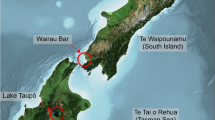Abstract
The purpose of this study was to identify shared and distinct features across land-based approaches to healing in different communities within Mushkegowuk Territory through interviews with individuals directly involved with land-based programs. Following from prior studies of land-based interventions with two different communities in northern Ontario, the present study utilized a two-eyed seeing approach to data collection and analysis that emphasized Indigenous methodology. Consistent with prior research, participants emphasized the broad significance of the role of nature; the value of culture and language; the role of Elders; the need for care and shared responsibility for a community and its members; and the importance of traditional knowledge as well as the risks associated with its loss. Programs included the transfer of traditional skills and knowledge related to living on the land, and were largely taught through demonstration and collaborative work, which enhanced participants’ sense of identity and emphasized bringing together youth and Elders to foster intergenerational connection. Participants in the current study emphasized the role of Elders in teaching traditional language to youth through engagement in land-based activities, as well as moral lessons that can be learned through engagement with nature. Finally, a reported focus of the present program involved enhancing participants’ sense of spirituality and facilitating a deeper connection to the Creator through prayer and respect for the land.
Similar content being viewed by others
References
Alberta Education (2009). Cree language and culture: 12-year program guide to implementation. https://education.alberta.ca/media/563938/cree-12y-guide-to-implementation-k-3.pdf.
Bartlett, C., Marshall, M., & Marshall, A. (2012). Two-eyed seeing and other lessons learned within a co-learning journey of bringing together Indigenous and mainstream knowledges and ways of knowing. Journal of Environmental Studies and Sciences, 2, 331–340. https://doi.org/10.1007/s13412-012-0086-8.
Browne, A. J., Varcoe, C., Lavoie, J., Smye, V., Wong, S. T., Krause, M., Tu, D., Khan, K., & Fridkin, A. (2016). Enhancing health care equity with Indigenous populations: Evidence-based strategies from an ethnographic study. BMC Health Services Research, 16, 544. https://doi.org/10.1186/s12913-016-1707-9.
Canadian Institutes of Health Research, Natural Sciences and Engineering Research Council of Canada, & Social Sciences and Humanities Research Council (2018). Tri-Council Policy Statement: Ethical Conduct for Research Involving Humans. https://ethics.gc.ca/eng/policy-politique_tcps2-eptc2_2018.html.
Canadian Psychological Association & The Psychology Foundation of Canada (2018). Psychology’s response to the Truth and Reconciliation Commission of Canada’s Report. https://cpa.ca/docs/File/Task_Forces/TRC%20Task%20Force%20Report_FINAL.pdf.
Danto, D., & Walsh, R. (2017). Mental health perceptions and practices of a Cree community in northern Ontario: A qualitative study. International Journal of Mental Health and Addiction, 15(4), 725–737.
George, J., MacLeod, M., Graham, K., Plain, S., Bernards, S., & Wells, S. (2018). Use of traditional healing practices in two Ontario First Nations. Journal of Community Health, 43, 227–237.
Government of Canada (2017a). Indigenous peoples and communities. https://www.rcaanc-cirnac.gc.ca/eng/1100100013785/1529102490303.
Government of Canada (2017b). First Nations. https://www.rcaanc-cirnac.gc.ca/eng/1100100013791/1535470872302.
Government of Canada (2017c). Métis. https://www.rcaanc-cirnac.gc.ca/eng/1100100014427/1535467913043.
Government of Canada (2019). Inuit. https://www.rcaanc-cirnac.gc.ca/eng/1100100014187/1534785248701.
Hall, L., Dell, C. A., Fornssler, B., Hopkins, C., Mushquash, C., & Rowan, M. (2015). Research as cultural renewal: Applying two-eyed seeing in a research project about cultural interventions in First Nations addictions treatment. International Indigenous Policy Journal, 6(2), 1–15.
Kovach, M. (2009). Indigenous methodologies: Characters, conversations, and contexts. University of Toronto Press.
Lehman, B. J., David, D. M., & Gruber, J. A. (2017). Rethinking the biopsychosocial model of health: Understanding health as a dynamic system. Social and Personality Psychology Compass, 11(8), e12328.
Marsh, T. N., Cote-Meek, S., Toulouse, P., Najavits, L. M., & Young, N. L. (2015). The application of two-eyed seeing decolonizing methodology in qualitative and quantitative research for the treatment of intergenerational trauma and substance use disorders. International Journal of Qualitative Methods, 14(5), 1–13.
Minthorn, R. S., & Shotton, H. J. (2018). Reclaiming Indigenous research in higher education. Rutgers University Press.
Peltier, C. (2018). An application of two-eyed seeing: Indigenous research methods with participatory action research. International Journal of Qualitative Methods, 17, 1–12.
Reading, C., & Wien, F. (2013). Health inequalities and the social determinants of Aboriginal peoples’ health. National Collaborating Centre for Indigenous Health. https://www.nccih.ca/495/Health_inequalities_and_the_social_determinants_of_Aboriginal_peoples__health_.nccih?id=46.
Roué, M. (2006). Healing the wounds of school by returning to the land: Cree elders come to the rescue of a lost generation. International Social Science Journal 58(187), 15–24.
Smith, L. T. (2012). Decolonizing methodologies (2nd ed.). Zed Books Ltd.
Sommerfeld, J., Danto, D., & Walsh, R. (2019). Indigenous land-based interventions and nature-oriented wellness programs: Commonalities and important differences. Journal of Concurrent Disorders, 1(3), 37–35.
The First Nations Information Governance Sector (2014). Ownership, Control, Access and Possession (OCAP™): The path to First Nations information governance. https://fnigc.ca/sites/default/files/docs/ocap_path_to_fn_information_governance_en_final.pdf.
Verwoord, R., Mitchell, A., & Machado, J. (2011). Supporting Indigenous students through a culturally relevant assessment model based on the medicine wheel. Canadian Journal of Native Education, 34(1), 49–66.
Walsh, R., Danto, D., & Sommerfeld, J. (2020). Land-based intervention: A qualitative study of the knowledge and practices associated with one approach to mental health in a Cree community. International Journal of Mental Health and Addictions, 18(1), 207–221.
Wildcat, M., McDonald, M., Irlbacher-Fox, S., & Coulthard, G. (2014). Learning from the land: Indigenous land based pedagogy and decolonization. Decolonization: Indigeneity, Education & Society, 3(3), I–XV.
Acknowledgments
The authors express their appreciation for the hospitality and participation of the participants and the community in Mushkegowuk Territory. We acknowledge the contributions of the University of Guelph-Humber psychology students: Sara Mancuso and Marlena Williams.
Author information
Authors and Affiliations
Corresponding author
Ethics declarations
Conflict of Interest
The authors declare that they have no conflict of interest.
Additional information
Publisher’s Note
Springer Nature remains neutral with regard to jurisdictional claims in published maps and institutional affiliations.
Rights and permissions
About this article
Cite this article
Danto, D., Walsh, R. & Sommerfeld, J. Learning from Those Who Do: Land-Based Healing in a Mushkegowuk Community. Int J Ment Health Addiction 19, 2131–2143 (2021). https://doi.org/10.1007/s11469-020-00306-z
Published:
Issue Date:
DOI: https://doi.org/10.1007/s11469-020-00306-z




